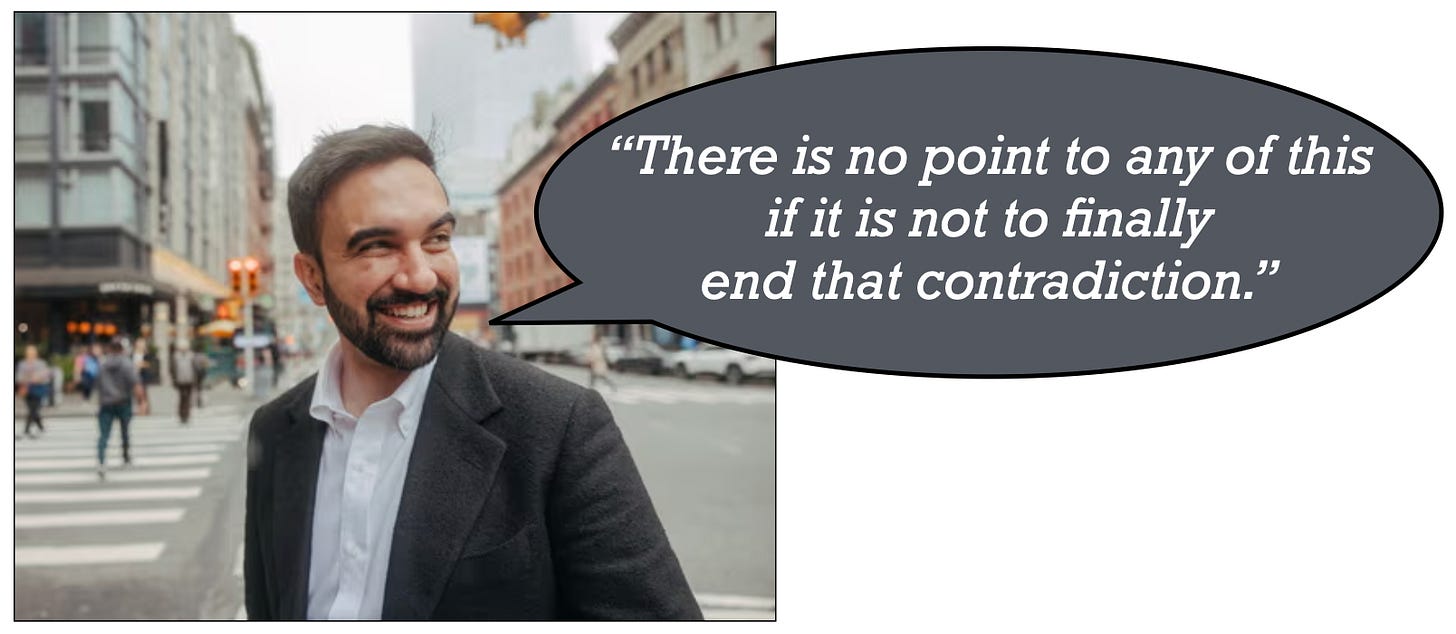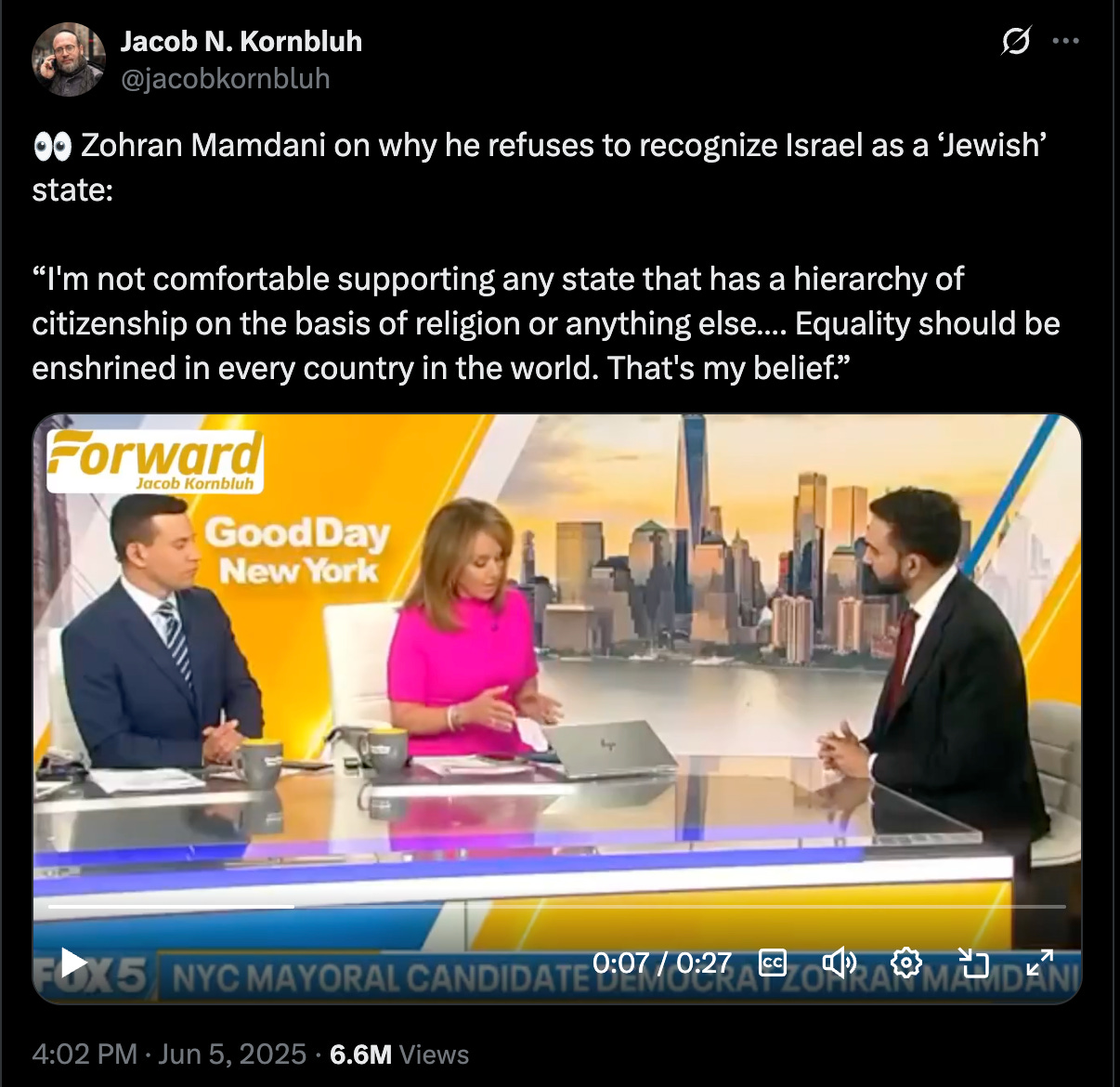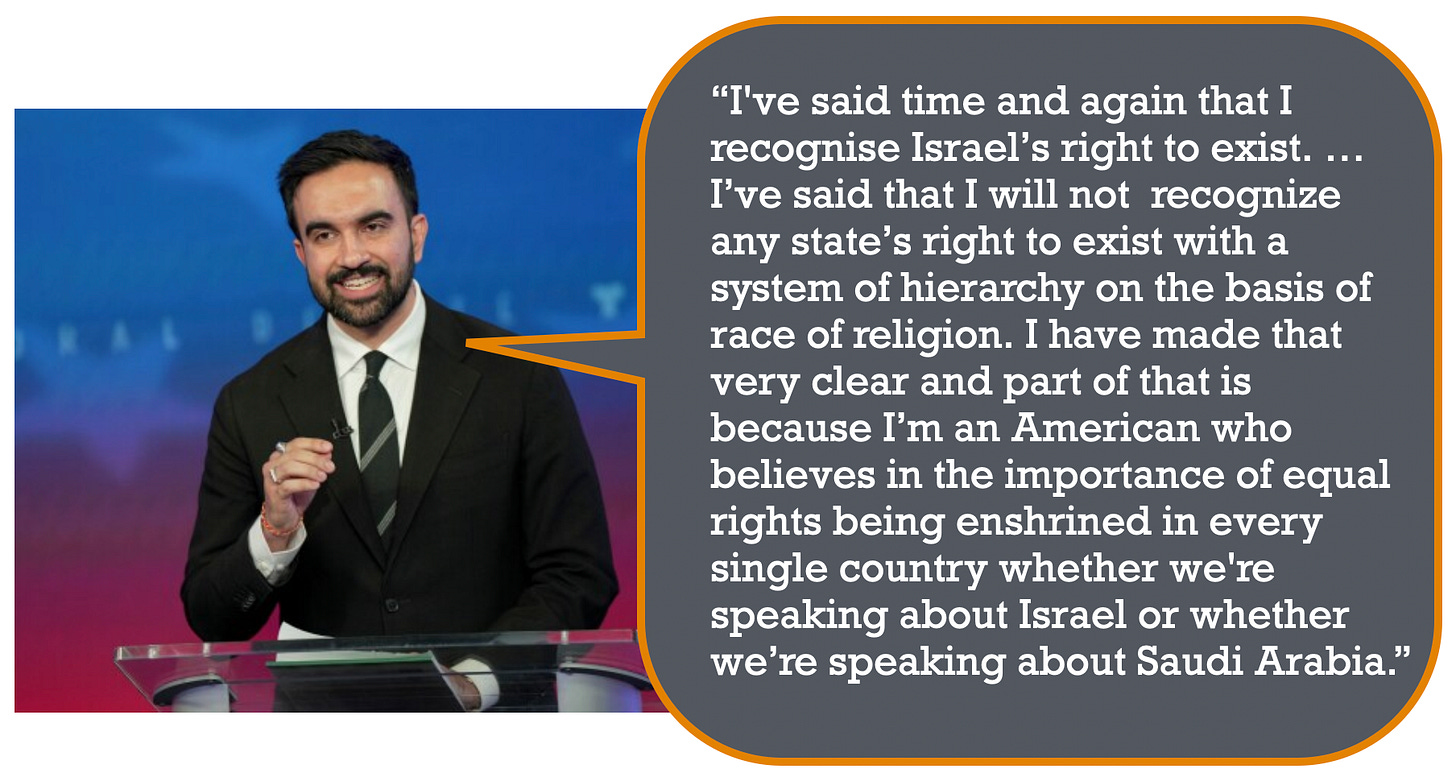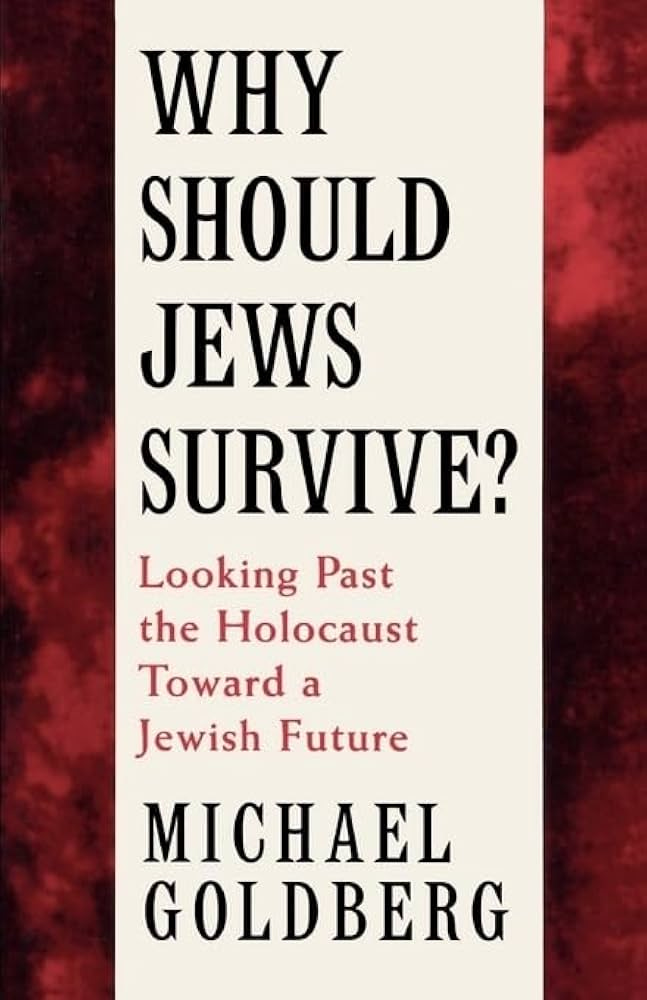Zohran Mamdani and The Glorious End of An Extremely Annoying Contradiction
If you set aside Mamdani's hypocrisy and hubris, you'll understand the popularity of a media-savvy guy who promises to simplify a complicated world.
{This interview with my very old friend Gary, who has seen it all, has been edited for length and clarity.}Gary: Ahh, yes. Ending the contradiction of a Jewish nation-state. … 🤦♂️ » Or, in the words of my Grandma Rose: Der eyngl iz m’shuge.
Alan: Which means?
Gary: That’s Yiddish for “the boy is crazy.”
Alan: Why crazy?
Gary: Because his ideas are toxic, and I don’t mean the socialism stuff. Making New York City more affordable is a noble and worthy goal. But Mamdani evidently believes “there’s no point to any of this” unless he hastens the demise of the world’s one Jewish state. In his own words:
Alan: What’s the problem? He sounds reasonable and consistent.
Gary: Gahhh… he’s spouting nonsense. I’ve been alive for almost 4,000 years, so I’ve heard this ‘end of contradiction’ blather before.
Alan: From whom?
Gary: History is filled with people who think they’ve discovered the magic wand that will make life’s many challenges, mysteries, and contradictions disappear.
For instance, Francis Fukuyama once believed that after the fall of the Soviet Union, we’d arrived at “the end of history” and that liberal democracy was humanity’s only remaining political option. Sooo… let’s invade Iraq, depose Saddam, and plant the seeds for a liberal democracy and a new Middle East. Fukuyama was wrong. … My college roommate, freshman year, pored over The Marx-Engels Reader as if it were Holy Writ. It’s all about the class struggle, he assured me. As the decades passed, he came to appreciate that life is complicated. Now he attends meetings of the Religious Society of Friends (although I think he still has a soft spot for Marx). … Friedrich Hayek and Milton Friedman believed there was no problem the free market couldn’t solve. … E.O. Wilson urged us to Trust The Science because physics, chemistry, and biology are the only tools we need to unlock the mysteries of the universe. … Mohammed thought he’d resolved all history’s contradictions, which is why Islam calls him The Final Prophet: That’s all, folks! … Jesus also believed he was the Final Hinge Point of History: “I am the way and the truth and the life. No one comes to the Father except through me.” … See also: The Pope. The Crusaders. Martin Luther. Caesar. Putin. Trump. The Muslim Brotherhood. Mao. Stalin. Most house cats. And let’s not forget Hitler!
If someone insists they’ve discovered The Final Solution, I sound the alarm and scream at people to run for the exits.
Alan: Slow down and take a breath, cowboy. … Why is Zohran Mamdani’s quote (above) a “final solution”?
Gary: When he says he wants to “finally end that contradiction,” he’s talking about eliminating Zionism, which is the right of the Jewish people to national self-determination in their ancestral homeland. Mamdani believes Israel should be more like France, say, or the U.K., even though both countries are struggling to resolve explosive contradictions of their own. And it’s not just the clip above. Zohran strikes the same anti-Zionist theme again and again:
Alan: Wait… you’re against equality and you support hierarchy, apartheid, racism, caste systems, and oppression?
Gary: I believe that every human being is equally sacred in the eyes of G*d. But you’re missing two critical points.
Alan: Which are?
Gary: First, Zohran is a hypocrite. In the recent NYC mayoral debate, he hit this same anti-Zionist note, but with more specificity:
Gary: … In other words, he will not accept Israel as a Jewish state, even though the Jews are neither a race nor a religion.
Alan: That’s not hypocritical. It’s entirely consistent with his stated values, which are universal: Equal rights for everyone, everywhere.
Gary: When have you heard Mamdani complain about China and Pakistan's failure to uphold human rights? When has he demanded that Saudi Crown Prince Mohammed bin Salman allow Christian and Mormon missionaries to establish churches in Mecca? When has he demanded an end to the mullah’s reign of terror in Iran? Or Putin’s rule in Russia? And I don’t mean that he shares his universal ideals in passing during a mayoral debate. I’m talking about a serious, sustained, and substantive commitment to the universal values he says matter most.
For example, in 2013, when Zohran was a student at Bowdoin College, he co-founded a chapter of Students for Justice in Palestine, and pressured the school to join an academic boycott of Israeli institutions. Why didn’t he organize boycotts against the 27 countries that officially enshrine Islam as their state religion?
Alan: Maybe because the IDF has been killing Palestinians in Gaza.
Gary: Israel withdrew from Gaza in 2005. Then, the Palestinians elected Hamas. So, again, why didn’t Zohran organize protests against the Islamist thugs who violently dominated Gaza for 20 years?
Alan:
Gary: Exactly. Palestinians get a free pass. So do Iran and Saudi Arabia, and a rogue’s gallery of nations that don’t give a damn about human rights. Why, then, do you think Mamdani spends so much time vilifying the world’s only Jewish nation-state?
Alan: I hope you’re not suggesting that Zohran picks on Israel but not on Saudi Arabia because he’s a Muslim.
Gary: It’s a possibility. Israel exists on land that was once part of the Islamic caliphate, which means the existence of Israel within any borders in the eastern Mediterranean is a stick in the eye of Allah. It’s blasphemy.
The third Jewish commonwealth, reborn in 1948, is a painful reminder that the arc of history, in the mind of a faithful Muslim, is bending in the wrong direction. Islam is supposed to expand, not contract: The only way to get history back on its proper track is to destroy the world’s only sovereign Jewish nation-state.
Alan: That’s Islamophobic.
Gary: Stop. You’re embarrassing yourself.
Gary: … And even if we look past Mamdani’s hypocrisy and double-standards, consider his hubris: “I’m an American who believes in the importance of equal rights being enshrined in every single country….” Every single country!
Alan: Don’t you believe human rights are universal?
Our ‘shared imaginary’
Gary: Two responses.
First, human rights are a fiction. We made them up. They are figments of our collective imaginations, much to Tom Holland’s chagrin (and mine):
Gary: … Then again, we rely on all sorts of convenient fictions. Money, for instance: it only has value because we collectively believe it does. Crypto. Contracts. Constitutional law. International law. Traffic lights. Mother’s Day. National borders. The Infield Fly Rule. We made them all up because they are convenient, if not necessary, shared imaginaries that we collectively embrace so we can play the game of life without killing each other. So let’s not pretend that the freedom of speech or religion or assembly are objectively and universally true. They’re not. We made ‘em all up — and good for us!
Second, even though Westerners generally embrace the fiction of human rights, why should we demand that other nations, societies, and cultures “enshrine” this particular value? On what basis and on whose authority? Who made Zohran Mamdani the arbiter of what should or should not be enshrined in, say, Mauritania or Suriname or Tahiti or anywhere else in the world?
For hundreds of years, the British carried the torch of civilization to the far reaches of the world, in the firm belief they were Doing Good. But eventually the locals told the Brits to f*** off.
Alan: Well, the Brits can be a bit haughty. Their accent alone…
Gary: In their defense, the Brits have contributed a lot to the world: The Magna Carta, English common law, the Industrial Revolution, Isaac Newton, Charles Darwin, Shakespeare, Winston Churchill, and The Who, just to name a few.
Gary: … That said, to think that our Western values and way of life are the final word for everyone, everywhere is a dangerous mistake. It’s the sort of cultural and political hubris that led to bloodbaths in Vietnam, Afghanistan, and Iraq.
Alan: No one likes to be told what to do, how to live, or what to believe.
Gary: That’s right. And whatever happened to the progressive mantra that “diversity is our greatest strength”? If that’s true domestically, why shouldn’t we promote diversity as a universal value?
Alan: Universal diversity? Isn’t that an oxymoron? A contradiction?
Gary: No. It’s nationalism.
A ‘world of experiments’
Gary: … You’ve written about your concerns with Yoram Hazony’s National Conservatism movement, and I share many of your worries. But his vision, which Hazony says is rooted in the Bible1, is one I endorse:
The nationalism I grew up with is a principled standpoint that regards the world as governed best when nations are able to chart their own independent course, cultivating their own traditions and pursuing their own interests without interference. This is opposed to imperialism, which seeks to bring peace and prosperity to the world by uniting mankind, as much as possible, under a single political regime…. An order of independent nations would permit diverse forms of self-government, religion, and culture in a “world of experiments” that would benefit all mankind.
Gary: … This means China should do its Chinese thing. India should chart its own course. Saudi Arabia should express its Saudi Arabia-ness. Mexico, Canada, and the United States each have unique qualities that should (mostly) be defended, not eliminated. So, too, does Israel. In this ‘world of experiments,’ why can’t Zohran let Jews be Jews in their ancestral homeland?
Alan: Do you think Mamdani misunderstands the Jewish people?
Gary: He sees us the way millions of Muslims do: Jews have been superceded by Christianity, and later by Islam. Therefore, according to the revealed word of Allah, Jews should not have national sovereignty and power, especially over Muslims, and specifically in lands that were once Islamic.
To be fair, though, plenty of people don’t understand the Jews, so Zohran is hardly alone.
Alan: Who else doesn’t grasp the Jewish Story?
Hitler vs. Sinai
Gary: Bernie Sanders pops to mind, and he’s Jewish! He’s also a Democratic Socialist and a big Mamdani supporter. Problem is, if you ask Bernie what being Jewish means to him, this is what he says:
Gary: … Being a Jew, for Bernie, is about making sure the Holocaust never happens again to anyone, anywhere.
Alan: Amen.
Gary: Amen, indeed. But to suggest that the murder of six million Jews was primarily a violation of their human rights is to universalize the Holocaust. It’s effectively saying: This genocidal horror is like all of history’s other horrors because Jews are like everyone else. It amplifies the universal voice of Jewish history, which is real, but it suffocates the particular voice.
Alan: So? That seems like the perfect lesson to learn from the Holocaust: We’re all in this together.
Gary: Maybe it was the perfect lesson for Bernie’s generation. Most American Jews who grew up immediately after World War II wanted to blend in, to assimilate. They wanted to emphasize what we all share, instead of what makes us different.
As a result, Bernie and that generation of Jews built their identities on two pillars. One was Israel, a nation among the nations, reestablished in 1948 as our (then socialist) safe haven from the world’s anti-Semites. The other pillar was the Holocaust: We must maintain our Jewish identity and Jewish continuity, generation to generation, so that we don’t give Hitler a posthumous victory.
Alan: Yup, that’s exactly what I learned in the 1960s and 1970s. In Hebrew school, we donated money to plant trees in Israel and we read Elie Wiesel’s Night. When I was eight years old, right after the Six-Day War, I put a Moshe Dayan poster on my bedroom wall. But as I got older, the Holocaust-Israel identity didn’t feel like enough. It seemed empty and unsustainable.
Gary: How so?
Alan: I didn’t understand why Nazi Germany had become the main touchstone for our Jewish identity. Not giving Hitler a “posthumous victory” seemed like an absurd reason to be a Jew or to raise my children as Jews. There had to be something more to our 3,000-year-old history and tradition than giving Hitler the middle finger.
Gary: I wholeheartedly agree. Did you find anything?
Alan: Yes. I could tell you many stories, but this one should suffice (for now)…
Alan: … In this book, Rabbi Goldberg shares an anecdote that goes something like this:
At a workshop for the United Jewish Appeal, the featured speaker — a rabbi — asked the audience a question: “Why should Jews survive?”
“Jews should survive,” said one man, “because we can’t die off and give Hitler a posthumous victory.”
“Hmmm… okay,” said the rabbi. “Anyone else?”
“Jews should survive,” said one woman, “because we need to support the state of Israel against its many enemies.”
“Interesting,” said the rabbi. “Other thoughts?”
In the back of the room, an elderly gentleman slowly stood up.
“Jews should survive,” he said, “because we believe in the redemption of the world.”
“Yes,” the rabbi said with a smile. “We certainly do.”
Alan: … In other words, Jews should be defined not by the bad stuff that happens in life and in history, but by the Promise of a better world to come, not after we die, but in this world, on the stage of human history. This redemptive vision emerges not from the death camps, but from Jewish life; not from the defeat of Hitler, but from the embrace of our Covenant and our Story; not from the IDF, but from the scribes and prophets of Jerusalem.
We remember our trials and tribulations — Passover (ancient Egypt), Purim (ancient Persia), and Chanukah (the ancient Greeks) — only once a year, but we remember the Sabbath every week.
Gary: So, you believe that Jewish identity should be defined less by Auschwitz and more by Sinai.
Alan: Exactly. If Shabbat is a taste of the world to come, then we look forward to more bread and wine, family and friends, and a time when, individually and collectively, we stop working and creating to marvel at the blessings of Creation. Instead of focusing on past horrors, we focus on The Hope.
But I’m afraid I’ve digressed. What does all this have to do with Zohran Mamdani?
Messiah complexes and other delusion of grandeur
Gary: Mamdani believes that the Jewish state of Israel is a “contradiction” — and I agree with him.
Alan: You do??
Gary: Of course I do. Israel overflows with contradictions. Here are just five of them:
Universal vs. Particular: The Jewish theological tradition often speaks of G*d as the universal creator and ruler of all humanity. The existence of a single, exclusive nation-state for one religious-ethnic group can be seen as contradictory to this vision of a universal kingdom.
Jewish vs. Democratic state: A Jewish nation-state privileges one ethno-religious group, which can conflict with the principle of universal equality under the law. For Israel to be a Jewish and democratic state, Jews must continue to be the majority.
Law of Return vs. Citizenship: The Law of Return grants automatic citizenship to any Jew, regardless of their connection to Israel, but non-Jewish residents who have lived in the land for generations face bureaucratic and political obstacles to full equality and citizenship rights.
Ingathering of Exiles vs. Life in the Diaspora: Zionism was established to bring Jews home from their 2,000-year-long exile. But many Jews don’t want to leave the Diaspora.
Secular vs. Religious: The majority of the Israeli Jewish population identifies as secular or non-Orthodox, yet Orthodox religious authorities are given exclusive control over key aspects of private life, such as marriage, divorce, and burial.
Alan: So Mamdani is right. Israel is a tangle of contradictions.
Gary: Yes, and Jews have been wrestling with those contradictions (and many others) from the very beginning. The Talmud is Our Big Book of Contradictions: Rabbi Yehuda says X, while Rabbi Yochanan says Y. But this is not a bug, it’s a feature.
Judaism sacralizes debate and disagreement (among other things). Machloket L’shem Shamayim — “dispute for the sake of Heaven” — means that arguments are motivated not by animosity, pride, or a thirst for power, but by a desire to discover the truth of the Torah.
Israel means “he who struggles with G*d,” a deity who often seems like the biggest contradiction of all. Exhibit A: If G*d is all good, all just, and all powerful, then why do bad things happen to good people?2
Alan: The rabbi at my hometown shul once told me: There are no answers, Alan, there are only questions, and to ask those questions — that is what it means to be a Jew.
Gary: Perfect. As your rabbi suggests, Jews seek to master the art of living with life’s many contradictions.
Alan: Well, to be honest, his response didn’t feel perfect to me, mostly because the voices of my Christian friends were echoing in my ears: Your rabbi is wrong, Alan, because there is an answer, and his name is Jesus Christ. In his life, death, and resurrection, Christ answers all our questions and resolves all of life’s contradictions:
“He is before all things, and in him all things hold together.” — Colossians 1:17 (NIV)
Gary: I understand that worldview, but it seems as if Jesus created as many questions and contradictions as Christians claim that he answered.
Which (finally) leads me to my main point:
The Messiah — if and when he finally arrives, or, depending on your Story, when he returns — is the only one who will ultimately resolve, once and for all, the many ethical, political, and existential contradictions introduced and embodied by the people of Israel and their spiritual siblings. Until that day — until the arrival of the Messiah —
beware of false prophets.
Alan: Are you saying it’s not Zohran Mamdani’s job to “end the contradiction” of Zionism?
Gary: That’s precisely what I’m saying. The job of the Mayor of New York City is to manage the five boroughs — to sweep the streets, maintain the sewer system, oversee the public schools, keep the subway running, pay the police and firemen, balance the books, and pick up the trash.
Alan: Zohran clearly has much bigger plans. Do you think he has a Messiah Complex?
Gary: I don’t know. But if he truly believes…
… then Zohran Mamdani is a very dangerous man.
Yoram Hazony views the story of the Tower of Babel as a foundational biblical critique of imperialism and a justification for the existence of independent nation-states. He interprets the Babel story as a divine intervention to create diverse nations with their own unique traditions and borders, as opposed to a single, monolithic empire.
See: the Book of Job.








Well, both videos pissed me off good and proper. Mamdani because every word he said is true--if you substitute Israel for Palestine. And substitute thousands of years of homeland seeking instead of a few decades that began after all the surrounding Arab/Muslim countries said "no thanks."
And Bernie? Because he was poor? He doesn't even know enough about being Jewish to know the point of Exodus? Or that "care for widows, orphans, and the strangers within your gates" is the most repeated line in the Tanakh? No wonder the DSA progressives like him as their pet Jew. How bleached out his Judaism is!
I just can’t stand the guy (Mamdani). I would like to wipe that smug look off his face. But I promise to read this later and address the substance and not merely my visceral reaction to Mamdani’s spewing his nonsensical rhetoric and people swooning at same. Glad you are on Gary’s side — from the short piece of this I read Gary has his head on straight and not up Mamdani’s arse.